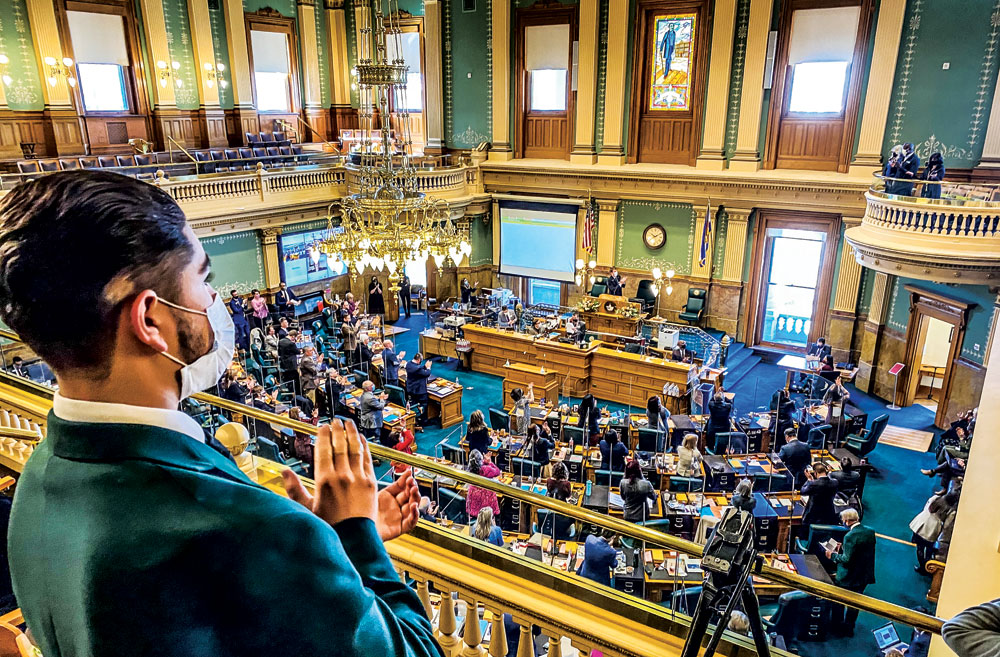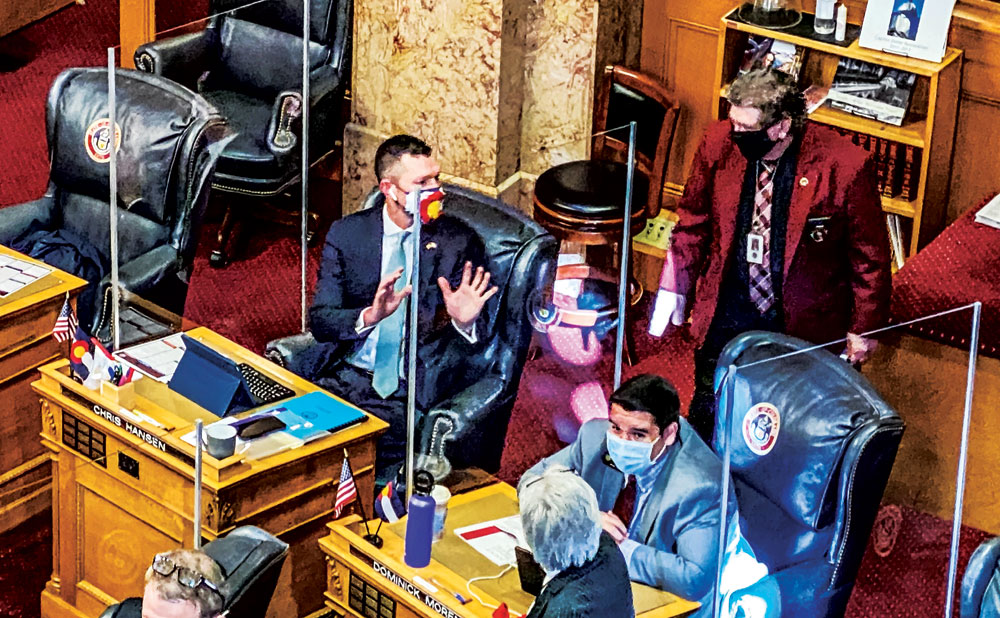
The Colorado House resumed the 2021legislative session on Feb. 16 after working for the first month in committees. Legislators are wearing masks and have plexiglass dividers between their desks.
After three days of warm-up in January, Colorado’s 2021 COVID-19 legislative session restarted on Feb. 16 and is now back in full swing.
Legislative leaders tried to tamp down expectations for the session, given the continuing pandemic. But the volume and variety of bills introduced after lawmakers returned indicate this will be a full and contentious session ranging over many issues.
The overriding issue is money. The state is in the anomalous position of having “extra” revenue on hand because pre-pandemic tax collections came in higher than was projected a year ago, giving 2021 lawmakers about $1 billion more than they expected to have.

Senator Chris Hansen District 31 (left) and Senator Dominick Moreno, District 21 (right) both serve on the Joint Budget Committee (as does Rep. Herod, below). Moreno is Committee Chair. To find your legislator, enter your address at https://leg.colorado.gov/find-my-legislator.
But this money is a one-time windfall. Gov. Jared Polis and lawmakers want to restore last session’s cuts in state programs, and the governor also wants to fund both “stimulus” programs to help the state economy and a big state reserve going into the 2022-23 budget year, when revenues are expected to be tight.
Here are the big issues.
The Budget
As it builds the 2021-22 budget, the Joint Budget Committee will have to figure out how to juggle restoration of the 2020 cuts, pay for the stimulus, save money for 2022-23, and pay for any other spending priorities.
The governor’s budget plan reduces spending in some state programs, delays restoration of some other cuts, and diverts projected Medicaid savings in order to do three things:
- Restore cuts in K-12 and higher education spending, to the tune of about $1 billion.
- Fund his stimulus proposals.
- Boost the reserve to create a cushion for 2022-23.

Senator James Coleman, Senate District 33
Committee members don’t necessarily disagree with those goals, but they have additional priorities. For instance, the committee wants to give bigger increases to state employees and state service providers than Polis proposed.
A big wildcard is how much federal pandemic relief the state will receive and to what degree that money can be used to help pay for regular state programs or offset some state spending.
Two Democratic legislators from northeast Denver, Sen. Chris Hansen of District 31 and Rep. Leslie Herod of District 8, serve on the six-member committee.
Stimulus
Polis started pitching his $1.3 billion stimulus package in November, when he released his 2021-22 budget proposal.
During the special session in December, lawmakers approved $382.2 million of state relief for small business, schools, childcare centers, and renters.
About $900 million in additional stimulus plans remain before legislators including: funding for worker retraining, business development, clean energy projects, broadband expansion, and state parks. Polis would like quick action on his plans, but some lawmakers would like to wait until the next wave of federal stimulus shapes up.
Education
Lawmakers face pandemic-related uncertainties in deciding how much to pay for schools in 2021-22.
Polis has proposed three key ideas for next year:
- Reduction of the Budget Stabilization Factor to $572 million.
- Bulking up the year-end balance in the State Education Fund to $460 million as a cushion for 2022-23.
- Earmarking of any additional money for “equity” funding, perhaps such as additional money for at-risk students.
But uncertainties about projected 2021-22 enrollment, the estimated number of at-risk students, changes in local district tax revenues, and the amount of new federal relief complicate school funding plans for next year.

Rep. Leslie Herod, House District 8
Testing, an under-the-radar issue in recent sessions, is back in the form of a bill that would instruct the Department of Education to seek a waiver from federal requirements for annual statewide testing in certain subjects.
There’s other education legislation on student media literacy, the school rating system, changes in teacher evaluation, expanded civics education, and student discipline.
Transportation
Lawmakers have long wrangled over transportation funding, including how to provide reliable revenue from the General Fund to the Department of Transportation.
Lawmakers, Polis, and the business group A Way Forward have been working on a plan that reportedly would include an annual $250 million transfer to transportation from the General Fund. In exchange for that, the group would support some sort of fee increase, such as on fuel sales or on road usage. Fees don’t have to be approved by voters, but minority Republicans are expected to oppose fees.
Health Care and Insurance
Observers also expect a big legislative debate over a perennial Democratic dream – creation of a public-option health insurance plan.

Rep. Steven Woodrow, House District 6
The basic concept is creation of a standard, lower cost plan that insurers would have to offer statewide. Health insurance choice and cost vary widely across Colorado.
But to control costs, the state would need greater power over charges by providers, such as hospitals.
Last session, the bill was shelved for fear Republican-stalling tactics would threaten other important legislation as lawmakers hurried to adjourn last June.
Democratic supporters are pushing the concept again and say it will look different than past plans, but details have been slow to emerge.
The Rest of the Agenda
Here’s a sampling of other issues facing lawmakers.
Criminal Justice—Ideas in the mix include measures to ban no-knock warrants, restrict the use of ketamine on people detained by police, fine-tune the 2020 police accountability law, expand corrections reforms, change laws on suspending drivers’ licenses, expand diversion for juvenile offenders, reform the felony murder laws, and modernize laws on sexual exploitation of children. Expect Herod to be at the center of many of these debates.
Environment—Proposals being discussed include regulation of methane leaks and other air quality issues, helping low-income communities affected by pollution, and regulation of plastic bags and foam containers.
Executive Powers—Minority Republicans have offered several bills to curb the governor’s powers during emergencies, but those won’t advance.
Gun Regulation—Democrats are pushing again for a mandatory waiting period for gun buyers, a safe storage law, and mandatory reporting of lost or stolen firearms.

Rep. Jennifer Bacon, House District 7
Revenue and Taxation—Voters last November approved a small decrease in state income tax rates. That’s prompted some Democrats to consider ways to replace and enhance revenues, specifically by ending some tax deductions and exemptions. Supporters believe that can be done without voter approval, but business interests oppose such efforts. Polis is pushing for tax breaks for small businesses and lower-income Coloradans.
Other bills in the mix are controls on prescription drug prices, capping the potency of marijuana products, easier abortion access for Medicaid clients, implementation of wolf re-introduction, allowing composting of human remains, and reform of judicial discipline procedures.
Todd Engdahl owns Capitol Editorial Services, a firm that provides legislative coverage, intelligence, and analysis to private clients. During a long career as an editor and public policy journalist, he served as executive city editor of The Denver Post, founder of DenverPost.com and a founder of Education News Colorado, which later became part of Chalkbeat Colorado.
Front Porch photos by Steve Larson


0 Comments